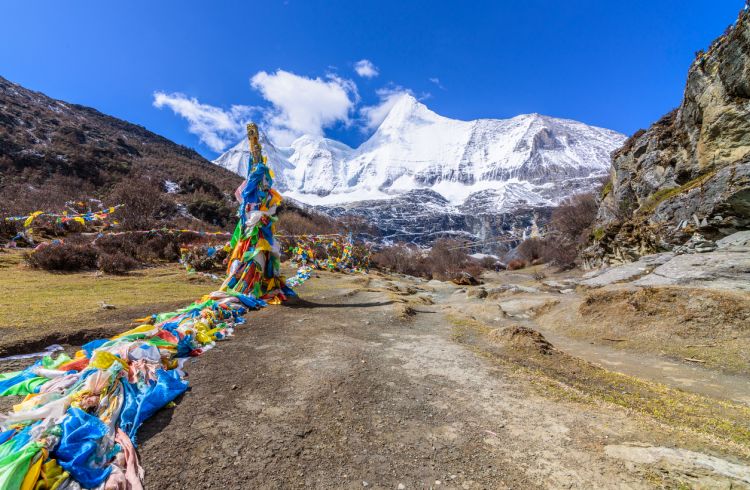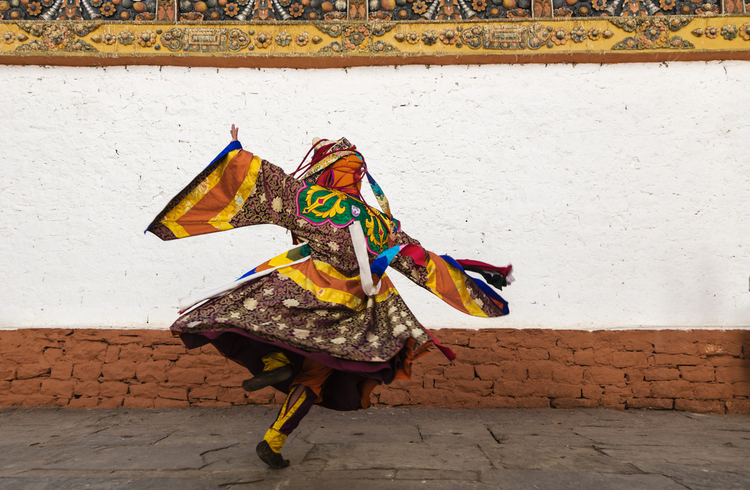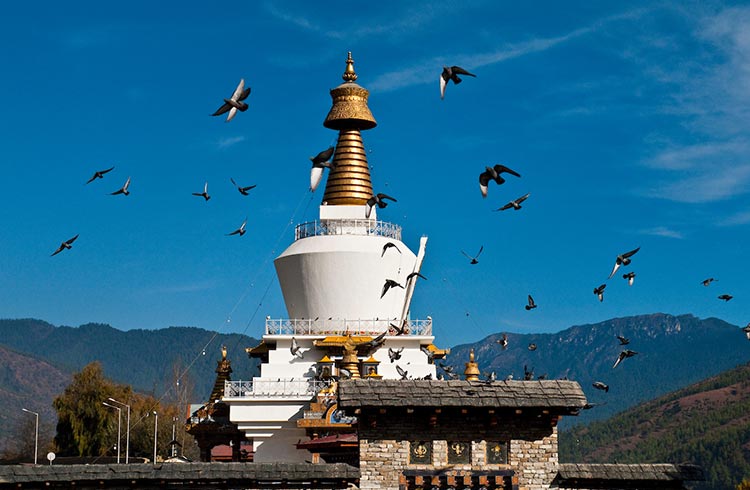9 Essential Health and Hygiene Tips for Travelers in Bhutan
Bhutan belly, altitude sickness and other diseases can strike down any traveler. Here's what you can do to stay healthy and safe while traveling in Bhutan.
 Photo © iStock/Theerapong28
Photo © iStock/Theerapong28
- Vaccinations for Bhutan
- Medical Treatment in Bhutan
- Mosquito-Borne Diseases
- Rabies
- Chili in Bhutan
- Bhutan Belly
- Women's Health
- Car Sickness
- Altitude Sickness
Vaccinations for Bhutan
As always, check your routine vaccinations are up to date including tetanus and diphtheria. Hepatitis A and typhoid are another two important shots to get regardless of whether your itinerary is low-key or more off the beaten track as both are easily transmitted by contaminated food and water.
Rabies is another vaccination you may want to think about getting if you're planning to spend a considerable amount of your trip in rural areas or outdoors in general.
Medical treatment in Bhutan
There are numerous hospitals and smaller basic health units scattered across the country however the main medical facility is the Jigme Dorji Wangchuck National Referral Hospital, located in Thimphu. Basic treatment and care at the hospital is free, even for tourists (this is where part of your daily spending goes). The standard of care and hygiene varies with some travelers experiencing minimal to no hygiene in facilities outside Thimphu.
If your condition is serious, contact your travel insurance provider immediately as it's likely that you will need to be evacuated to Thailand or India due to the lack of emergency-level facilities in Bhutan.
If your ailment is minor, it can be easy to treat yourself so it's worth packing a travel first kit and any medicines you take (along with a doctor's letter outlining the medication and its use). Pharmacies are in various towns however not all medications may be available for purchase or the quality may not be to the standard you obtain at home.
Mosquito-borne diseases
Yellow Fever is not found in Bhutan however if you are entering the country from a yellow fever-endemic country you will require proof of vaccination upon arrival.
Malaria
Overall, the risk to travelers is low. The Center for Disease Control and Prevention reports that Thimphu, Gaza, Paro and Bumthang are malaria-free but areas below 5577ft (1700m) near the India border are prone to malaria so if you are crossing into Bhutan from India, it's worth taking those antimalarials and covering up to prevent bites.
Dengue fever
Dengue fever is unfortunately endemic in Bhutan and there is no vaccination available to reduce the risk of catching this mosquito-borne disease. Bite prevention is your only way to minimize your chances of contracting it. The mosquitos which carry the disease are active during the day and tend to thrive more in urban areas such as towns and cities. Avoid standing water such as pools, ponds and containers where mosquitos will breed. As dengue exhibits many symptoms similar to other conditions such as diarrhea, headache and skin rash, it's best to seek medical so you can be treated correctly.
Typhoid
You are likely to encounter typhoid out of the urban centers where sanitation levels are likely low or poor and there is a risk of food and water contamination. Along with getting a vaccination, always observe good hygiene practices. Drink only treated or boiled water. That travel mantra of "boil it, cook it, peel it or forget it" applies here. Avoid unpasteurized dairy products too.
Ticks
Ticks tend to be a problem if you are planning to head out of town into more rural locations. So if you're hiking or walking; wear long-sleeved clothing, tuck your pants into your socks and apply a repellent. Stick to the middle of the trails and avoid going off the track. Always bathe and check yourself over when returning to your accommodation in case any have decided to take up residence in your skin, particularly in areas such as the groin, armpits and behind your ears. Check your gear over too.
Should you find a tick, remove it using fine-point tweezers to grab it as close to the skin as possible and pull upward with steady, even pressure. Avoid twisting as you pull it out. Clean the area thoroughly with an iodine scrub or soap and water, following that with rubbing alcohol including your hands. Do not crush the tick with your fingers as you risk injecting venom and leaving the head in your skin.
Rabies
Bhutan has made significant progress to hopefully eliminate rabies by 2020, however, it does still exist in some parts of the country with dogs and monkeys carrying the disease. So as cute as the street puppies may be, resist patting them even if they appear healthy. If you are bitten, contact your travel insurance emergency assistance immediately and seek medical help as post-bite treatment must occur within 24 to 48 hours as left untreated, rabies can be fatal. Gently wash the bite area with soap and water and apply an iodine-based antiseptic treatment.
Soil-Transmitted helminths
Also known as parasitic worms, they are transmitted via poor hygiene practices and contaminated food or water. Seek medical treatment if you feel unwell and experience abdominal pain, diarrhea, loss of appetite, bloating, vomiting or nausea.
Chili in Bhutan
With more tourists visiting the country each year, the variety of cuisines available in Bhutan has also increased. Not only will you find places serving the local dishes, but other foods we enjoy at home such as Chinese, Indian and even burgers. But that's not the reason you're in Bhutan.. you're there to try the local delights.
Walking through the capital Thimphu and many other towns, one thing stands out and that's chilies. Piled up at the markets, drying on rooftops and strung from windows; the Bhutanese embrace chilies from an early age. They use them in a number of different ways in cooking and they dominate meal times.
However, the locals are becoming conscious of their love for chili and eat it in moderation due to health concerns, especially digestion-related conditions such as stomach ulcers.
Chilli is used like a vegetable more than a spice and is often eaten fresh. So if you don't want to experience the burning ring of fire, make it clear to the waiter or chef. Plenty of eateries are making traditional dishes these days to the Western palette.
But for those who like it hot, try drinking the local cool-down beverage, dhachhu, which is similar to buttermilk with your meal.
Bhutan Belly
Unless you have a cast iron stomach, it's highly likely you will get at least a bit of an upset tummy and diarrhea at some point.
Avoid drinking the local tap water, unless you are staying somewhere that has water filters or purifiers installed. Otherwise, make sure your water is boiled or treated.
Even a salad that has been rinsed and has water on it or drinks with ice cubes should be avoided unless you know it's safe.
Fruits and vegetables that can be peeled, as well as packaged snacks, are always a safe option.
If you do get mild diarrhea, reach for the over-the-counter medicine you probably should already have in your first aid kit. If your condition gets worse including fever, seek medical help as you may need antibiotics unless you have brought some with you.
Rehydration is a must when combating traveler's diarrhea. If you can't find an electrolyte drink like Gatorade or Powerade, you can supplement with the salt/sugar/water ratio for oral rehydration: 1 tsp salt, 8 tsp sugar, for 1 liter of water.
Women's Health
Sanitary products are easily obtained in the urban centers of Bhutan however they are pretty much non-existent outside of town, so pack what you need before going.
Car Sickness
While you may normally not get car sick, pack some motion sickness tablets anyway. Bhutan's roads aren't that flash, particularly outside the major towns where it can sometimes be rough and windy along with hairpin bends.
Some short trips which would take you next to no time on upgraded roads may take you 2 hours or more as many roads across the kingdom are being upgraded so road works and conditions may slow the journey a bit. Thankfully, most Bhutanese drivers are courteous and patient, especially on the high windy mountain roads.
Altitude Sickness
Bhutan has plenty to offer all levels of adventurers, with soaring mountains and trails to cliff-top temples.
If you plan to hike in mountainous areas, you should familiarize yourself with the dangers of altitude or mountain sickness.
The condition occurs as you go higher the density of oxygen in the air decreases, meaning you're getting less with every breath.
You can get altitude sickness regardless of your physical fitness level or age. The key thing is to ascend slowly and acclimatize. If you do experience any symptoms of altitude sickness, stop and let your body adjust.
Symptoms include headache, fatigue, stomach illness, dizziness, and sleep disturbance. If you are experiencing any or several of these, you should reassess your plans and seek medical assistance.
Make sure you rehydrate thoroughly as dehydration occurs faster at higher altitudes.
Related articles
Simple and flexible travel insurance
You can buy at home or while traveling, and claim online from anywhere in the world. With 150+ adventure activities covered and 24/7 emergency assistance.
Get a quote

No Comments